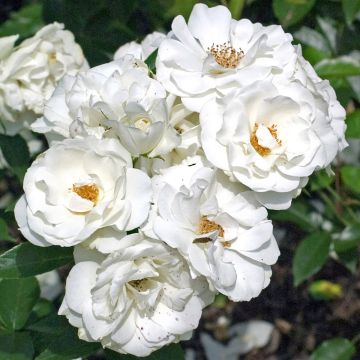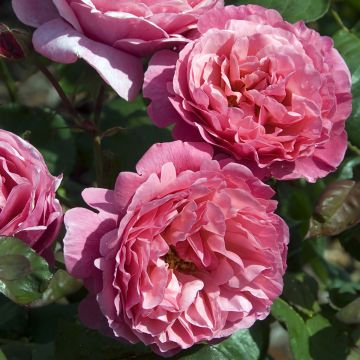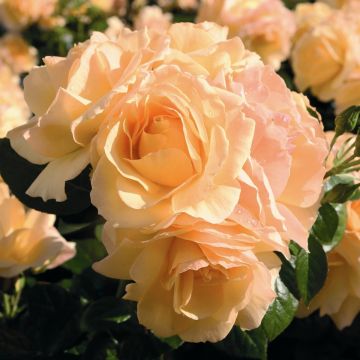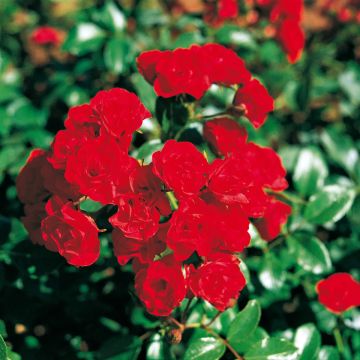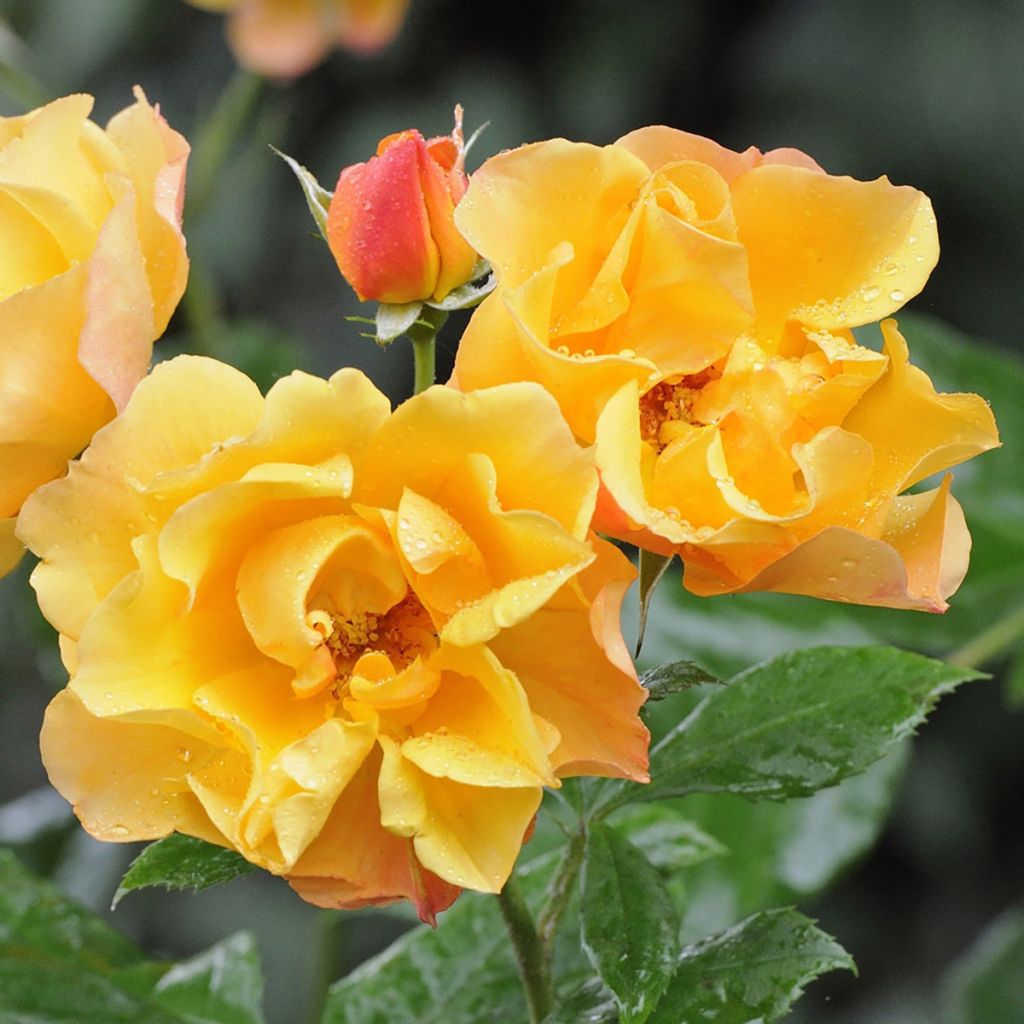

Rosier tige Tequila® Meipomolo
Rosa x floribunda Tequila Meipomolo - Standard Floribunda Rose
Rosa x floribunda Tequila® Meipomolo
Rose
Special offer!
Receive a €20 voucher for any order over €90 (excluding delivery costs, credit notes, and plastic-free options)!
1- Add your favorite plants to your cart.
2- Once you have reached €90, confirm your order (you can even choose the delivery date!).
3- As soon as your order is shipped, you will receive an email containing your voucher code, valid for 3 months (90 days).
Your voucher is unique and can only be used once, for any order with a minimum value of €20, excluding delivery costs.
Can be combined with other current offers, non-divisible and non-refundable.
Why not try an alternative variety in stock?
View all →This plant carries a 6 months recovery warranty
More information
We guarantee the quality of our plants for a full growing cycle, and will replace at our expense any plant that fails to recover under normal climatic and planting conditions.

Description
The Tequila Standard Rose Meipomolo forms a small tree with a crown covered in radiant clusters, where roses in shades of pink to orange bloom for weeks. This variety is known for its abundant autumn flowering, as well as its vigorous growth and excellent disease resistance. These qualities have earned it several prestigious awards in rose competitions. With its elegant tree-like habit, this standard rose deserves a prime spot in the garden or even in a large pot on the patio.
Standard roses are obtained by grafting a variety (in this case, the Tequila bush rose) onto a single, upright stem belonging to a different rose species (Rosa canina, R. laxa, or R. multiflora), with the graft being performed at the top. In very cold regions, it may be useful to protect the rootstock during winter.
The Tequila Rose is an excellent French creation by Meilland, dating back to 2004. It won the Golden Rose in Geneva in 2003, was named the Most Beautiful Rose in France, Grand Rose of the Century in Lyon in 2004, and Golden Rose in Orléans in 2005. This variety belongs to the floribunda rose family, which produces flowers in clusters. Grafted as a standard rose, it exhibits a characteristic habit, with a slender, vertical 'trunk' carrying a large, rounded crown. Its thorny stems bear semi-matte light green foliage, divided into small, tough, toothed leaflets. The young shoots are red to bronze in colour. It blooms regularly from June until August-September, with particularly abundant flowering in October, provided that faded flowers are regularly pruned and the plant does not lack water. The double flowers are gathered in clusters of 3 to 5 units, and they are 6-7 cm (2-3in) wide, composed of about twenty slightly undulate petals. The flower colour is a fairly dark yellow, touched with rose-orange on the outer petals. This rose does not have a fragrance. The plant is deciduous in winter.
This Tequila Standard Rose stands out in the garden from a distance. It makes a magnificent focal point, to be placed in the centre of a bed of light perennials, along a pathway, near the patio, as a standalone feature in a well-kept small garden, or in a large pot on the balcony. Its yellow to orange colour pairs well with white, red, blue, or purple flowers. For example, one can plant nepetas, chamomiles, perennial salvias, lavenders, love-in-a-mist, or baby's breath alongside it. A groundcover of silver mound or lady's mantle will showcase it perfectly.
Report an error about the product description
Plant habit
Flowering
Foliage
Botanical data
Rosa
x floribunda
Tequila® Meipomolo
Rosaceae
Rose
Cultivar or hybrid
Planting and care
Plant the 'Tequila' Rose from November to March from November to March, in ordinary, well-prepared, and well-drained soil. Roses prefer clay soils that are rather heavy than light. In soils that are too sandy, compact, or dry in summer, it is preferable to incorporate compost, decomposed manure, or humjus at the bottom of the planting hole. However, this rose dislikes waterlogged soils in winter. Place it in a sunny location, preferably in partial shade. Roses are hungry plants, and a specific fertiliser application will be beneficial at the start of vegetation, and regularly throughout the flowering period.
To encourage reblooming, regularly remove faded old flowers. Floribunda rose varieties are more vigorous and floriferous than large-flowered rose varieties. Therefore, prune the stems by about a quarter of their length (from 4 to 6 buds from the base of the stem) in late winter. Always prune above an outward-facing bud to allow the bush to bush out and prevent the branches from tangling in the centre of the branches.
Planting period
Intended location
Care
This item has not been reviewed yet - be the first to leave a review about it.
Haven't found what you were looking for?
Hardiness is the lowest winter temperature a plant can endure without suffering serious damage or even dying. However, hardiness is affected by location (a sheltered area, such as a patio), protection (winter cover) and soil type (hardiness is improved by well-drained soil).

Photo Sharing Terms & Conditions
In order to encourage gardeners to interact and share their experiences, Promesse de fleurs offers various media enabling content to be uploaded onto its Site - in particular via the ‘Photo sharing’ module.
The User agrees to refrain from:
- Posting any content that is illegal, prejudicial, insulting, racist, inciteful to hatred, revisionist, contrary to public decency, that infringes on privacy or on the privacy rights of third parties, in particular the publicity rights of persons and goods, intellectual property rights, or the right to privacy.
- Submitting content on behalf of a third party;
- Impersonate the identity of a third party and/or publish any personal information about a third party;
In general, the User undertakes to refrain from any unethical behaviour.
All Content (in particular text, comments, files, images, photos, videos, creative works, etc.), which may be subject to property or intellectual property rights, image or other private rights, shall remain the property of the User, subject to the limited rights granted by the terms of the licence granted by Promesse de fleurs as stated below. Users are at liberty to publish or not to publish such Content on the Site, notably via the ‘Photo Sharing’ facility, and accept that this Content shall be made public and freely accessible, notably on the Internet.
Users further acknowledge, undertake to have ,and guarantee that they hold all necessary rights and permissions to publish such material on the Site, in particular with regard to the legislation in force pertaining to any privacy, property, intellectual property, image, or contractual rights, or rights of any other nature. By publishing such Content on the Site, Users acknowledge accepting full liability as publishers of the Content within the meaning of the law, and grant Promesse de fleurs, free of charge, an inclusive, worldwide licence for the said Content for the entire duration of its publication, including all reproduction, representation, up/downloading, displaying, performing, transmission, and storage rights.
Users also grant permission for their name to be linked to the Content and accept that this link may not always be made available.
By engaging in posting material, Users consent to their Content becoming automatically accessible on the Internet, in particular on other sites and/or blogs and/or web pages of the Promesse de fleurs site, including in particular social pages and the Promesse de fleurs catalogue.
Users may secure the removal of entrusted content free of charge by issuing a simple request via our contact form.
The flowering period indicated on our website applies to countries and regions located in USDA zone 8 (France, the United Kingdom, Ireland, the Netherlands, etc.)
It will vary according to where you live:
- In zones 9 to 10 (Italy, Spain, Greece, etc.), flowering will occur about 2 to 4 weeks earlier.
- In zones 6 to 7 (Germany, Poland, Slovenia, and lower mountainous regions), flowering will be delayed by 2 to 3 weeks.
- In zone 5 (Central Europe, Scandinavia), blooming will be delayed by 3 to 5 weeks.
In temperate climates, pruning of spring-flowering shrubs (forsythia, spireas, etc.) should be done just after flowering.
Pruning of summer-flowering shrubs (Indian Lilac, Perovskia, etc.) can be done in winter or spring.
In cold regions as well as with frost-sensitive plants, avoid pruning too early when severe frosts may still occur.
The planting period indicated on our website applies to countries and regions located in USDA zone 8 (France, United Kingdom, Ireland, Netherlands).
It will vary according to where you live:
- In Mediterranean zones (Marseille, Madrid, Milan, etc.), autumn and winter are the best planting periods.
- In continental zones (Strasbourg, Munich, Vienna, etc.), delay planting by 2 to 3 weeks in spring and bring it forward by 2 to 4 weeks in autumn.
- In mountainous regions (the Alps, Pyrenees, Carpathians, etc.), it is best to plant in late spring (May-June) or late summer (August-September).
The harvesting period indicated on our website applies to countries and regions in USDA zone 8 (France, England, Ireland, the Netherlands).
In colder areas (Scandinavia, Poland, Austria...) fruit and vegetable harvests are likely to be delayed by 3-4 weeks.
In warmer areas (Italy, Spain, Greece, etc.), harvesting will probably take place earlier, depending on weather conditions.
The sowing periods indicated on our website apply to countries and regions within USDA Zone 8 (France, UK, Ireland, Netherlands).
In colder areas (Scandinavia, Poland, Austria...), delay any outdoor sowing by 3-4 weeks, or sow under glass.
In warmer climes (Italy, Spain, Greece, etc.), bring outdoor sowing forward by a few weeks.































